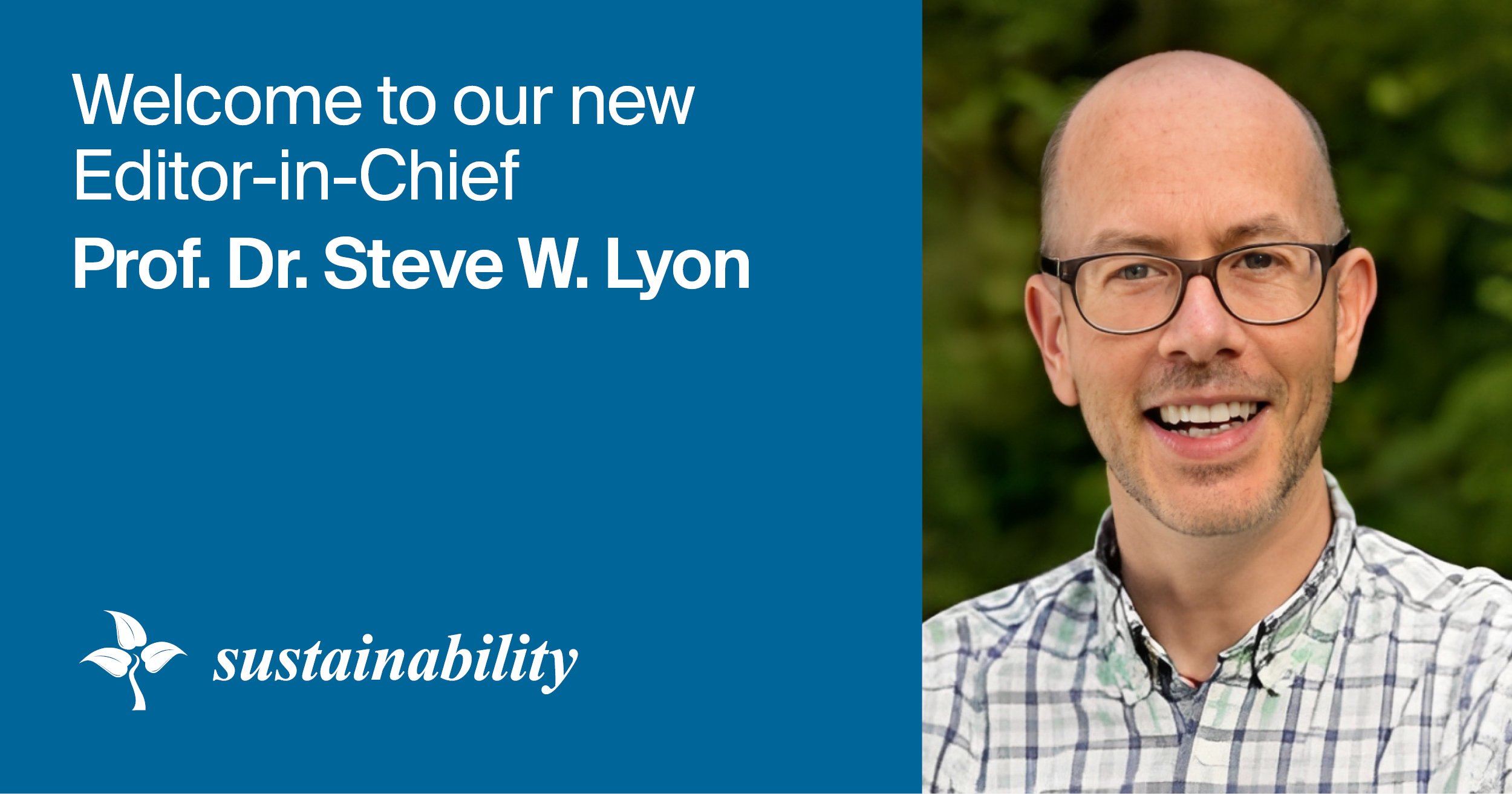
Journal Menu
► ▼ Journal Menu-
- Sustainability Home
- Aims & Scope
- Editorial Board
- Reviewer Board
- Topical Advisory Panel
- Instructions for Authors
- Special Issues
- Topics
- Sections & Collections
- Article Processing Charge
- Indexing & Archiving
- Editor’s Choice Articles
- Most Cited & Viewed
- Journal Statistics
- Journal History
- Journal Awards
- Society Collaborations
- Conferences
- Editorial Office
Journal Browser
► ▼ Journal BrowserNeed Help?
Announcements
10 September 2025
Prof. Dr. Steve W. Lyon Appointed Editor-in-Chief of Sustainability

Please join us in welcoming our new Editor-in-Chief, Prof. Dr. Steve W. Lyon, who has assumed editorial leadership over Sustainability (ISSN: 2071-1050) in September 2025. We would like to extend our gratitude to Prof. Dr. Marc A. Rosen for his commitment as Editor-in-Chief of Sustainability over the past few years.
Name: Prof. Dr. Steve W. Lyon
Homepage: https://senr.osu.edu/our-people/steven-w-lyon
Affiliation: School of Environment and Natural Resources, Ohio State University, USA
Interests: hydrology; water resources; sustainable development
Prof. Dr. Lyon attended Purdue University and graduated with a BSc in agricultural and biological engineering. He completed his MSc and PhD both in biological and environmental engineering at Cornell University, exploring how we incorporate the spatial structure of shallow water tables into hydrology. Prof. Dr. Lyon conducted his postdoctoral research at the University of Arizona, focusing on the evolution of land–water interactions in space and time. He joined the Department of Physical Geography at Stockholm University in 2008 and was promoted to Full Professor in 2016. During this time, he worked with The Nature Conservancy as a Freshwater and Conservation Scientist. Since August 2019, Prof. Dr. Steve W. Lyon has been a member of the faculty in the School of Environment and Natural Resources at Ohio State University, serving as an Associate Professor in Hydrology and Water Resources.
The following is a short Q&A with Prof. Dr. Steve W. Lyon, who shared his vision for the journal with us, as well as his views on the field of sustainability:
1. What is your vision for the journal?
My vision is to build on Sustainability’s strong foundation by fostering excellence, inclusivity, and innovation in research. I aim to further strengthen the rigor of our review process, enhance the quality of published science, and ensure the journal remains a global platform where interdisciplinary research informs meaningful change in academia, policy, industry, and society.
2. What are your thoughts on the growth of open access publishing?
Now more than ever, open access is essential for advancing transparent, reproducible, and widely accessible research. By removing barriers to knowledge sharing, it fosters collaboration, accelerates scientific progress, and ensures that high-quality scholarship informs both global dialogue and real-world solutions.
3. Could you briefly introduce your main research areas and achievements?
I work primarily in hydrology and water resources with my background in agricultural engineering. As water touches on so many aspects of life, from energy production to waste management to food security to environmental quality, my research tends to land broadly across sustainability science. My current interests include exploring the efficacy of conservation practices for treating agricultural runoff, understanding the implications and barriers for adoption of climate-smart practices, and establishing the potential for native vegetation to serve as nature-based solutions for flooding.
4. What attracted you to the journal and inspired you to take on the role of Editor-in-Chief?
I love the challenge of defining sustainability in a way that not only makes sense to academics but also has some utility for people. Sustainability continuously grows and evolves as a science becoming more nuanced every day, which is evidenced by the current breadth of our journal. In the role of Editor-in-Chief, I hope to further advance sustainability as a science by strengthening our communication around what sustainability is at its core and by emphasizing the fidelity across our published articles as they pertain to sustainability.
5. From your perspective, what are the anticipated key priorities and potential breakthroughs in sustainability research over the next five to ten years?
Technology is an easy answer here. The opportunities (and challenges) around artificial intelligence, big data, and sensor technology are bringing new ways to explore old problems. It is exciting to see how the interconnectedness of data collected across unprecedented spatiotemporal scales can be used to pinpoint impacts and influences among environmental, societal, and economic spaces. Of course, all this technology does nothing without a core understanding of the human dimensions where science interfaces with people through truly usable policies and secured livelihoods. As such, breakthroughs will come to sustainability through our co-creation of the science with those being impacted by the outcomes.
6. Do you have any advice for young researchers?
Do not shy away from interdisciplinary work. Yes, you need to be an expert in your field but there is a ton to learn from others. Leveraging expertise beyond your discipline can really help elevate the quality of the questions your research can answer. Further, bringing your expertise and experience to tackle a new problem in a new field can often bring about innovation.
We wish our new Editor-in-Chief, Prof. Dr. Steve W. Lyon, success in both his research and the development of the journal. Further details regarding the Editorial Board can be found via the following link: https://www.mdpi.com/journal/sustainability/editors.



